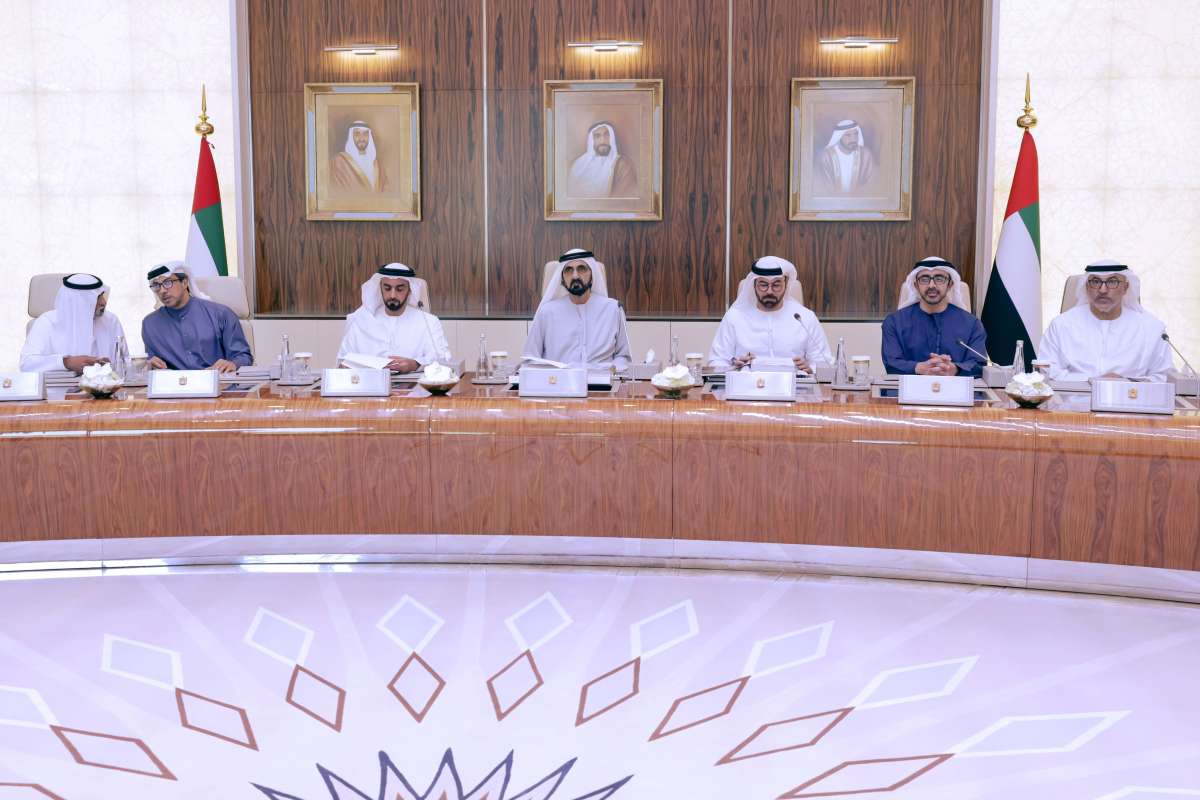The United Arab Emirates has exceeded the Dh2 trillion barrier for the first time in history…reports Asian Lite News
UAE’s foreign trade achieved a historical record reaching more than AED2.2 trillion, a growth of 17 percent, said Sheikh Mohammed bin Rashid Al Maktoum, Vice President, Prime Minister and Ruler of Dubai.
Sheikh Mohammed chaired the UAE Cabinet meeting at Qasr Al Watan Abu Dhabi where they reviewed the results of the UAE’s foreign trade in 2022.
“Today, I chaired the UAE cabinet meeting in Abu Dhabi. We expressed our sincere condolences and sympathy to Syrian and Turkish people, as well as the families of victims. Based on the directives of President Sheikh Mohamed bin Zayed Al Nahyan, all disaster relief work teams have been directed to coordinate with the two brotherly countries to provide all kinds of aid,” Sheikh Mohammed said.
The cabinet also approved the National Framework for Sustainable Development in the UAE.
“The goal is to preserve ecosystems and ensure the sustainability of our natural resources. We also assigned the Ministry of Climate Change and Environment to coordinate government efforts in preparation for hosting COP28,” he added.
The cabinet also approved the executive decisions to establish the National Space Fund, which aims to support the implementation of ambitious national projects in the field of space, support youth capabilities and competencies, and attract the best space companies to the UAE market.

UAE non-oil foreign trade
The non-oil foreign trade of the UAE achieved record growth rates in 2022, reaching AED2 trillion and 233 billion, with a growth rate of 17 percent compared to 2021.
The country has exceeded the AED2 trillion barrier for the first time in history. This achievement comes after the country’s non-oil foreign trade achieved a growth of 12 percent in 2020, recording AED1,496 trillion, and recorded a jump of 28 percent in 2021 to reach AED1,911 trillion.
National Framework for Sustainable Development
The UAE Cabinet approved the National Framework for Sustainable Development, which represents a comprehensive framework for all approved national strategies, policies and agendas concerned with organising environmental work in the country, and maintaining a sustainable environment that supports economic growth. The framework includes 5 main pillars: nature, environmental health, climate change, living organisms, and biosecurity.
The National Framework aims to enhance the quality of life in the country, promote diversification and economic prosperity, preserve the UAE’s ecosystems, sustain its ecological resources and services, and support the achievement of the 2030 Sustainable Development Goals.
In 2022, the UAE topped the Yale University’s 2022 Environmental Performance Index in six environmental indicators globally, becoming the first regionally, in the Arab world and in the Gulf.
COP28
As part of the ongoing preparation for the UAE to host the 28th Conference of the Parties (COP28), the cabinet approved assigning the Ministry of Climate Change and Environment to coordinate with federal and local authorities to prepare the country’s readiness plan for the event, and ensure the participation of federal government entities in organising this global event.
UAE Green Agenda 2030
The Cabinet was briefed on developments in the implementation of the UAE Green Agenda 2030, which aims to achieve the goals of sustainable development, and the objectives of the UAE Centennial 2071.
During the coming period 2023-2030, the UAE will implement initiatives and projects to support the goals of green economy, including increasing GDP by 4 percent to 5 percent by 2030, increasing exports by about AED24 to 25 billion by 2030, and reducing emissions from 430 kilowatt-hours in 2013 to less than 100 kilowatt-hours by 2030.
National Space Fund
During the meeting, a resolution regarding the establishment of the National Space Fund was adopted. The Fund which will be managed and supervised by the UAE Space Agency, aims to build national capabilities and competencies, raise the economic contribution to diversifying the national economy, and consolidate the UAE’s position in the space sector.
The Fund is set to develop the infrastructure supporting the space industry, and create an appropriate environment to attract startup companies in space. In addition, the National Space Fund aims at adopting governance systems to achieve leadership in the space sector, attracting specialised global companies, and building partnerships between national and international advanced technology companies.
National policies for Cybersecurity
The Cabinet meeting approved the National Policy for IoT security, the National Programme for Cybersecurity Accreditation, the National Policy for Cloud Security. In addition to a number of related policies aiming at providing solutions for current and future challenges related to cybersecurity.
The meeting also approved the formation of a national committee to combat cyber-attacks.

Advance Government work with AI technologies
The Cabinet approved a policy to raise the efficiency of government work through the use of artificial intelligence technologies. The policy includes standards and guidelines that guarantee safe use of AI, and the scope of its use in government work.
The policy aims at increasing the productivity and efficiency in various sectors, enhancing competitiveness and the quality of government services, and provides more training opportunities for employees.
“Made in UAE”
The Cabinet adopted a decision on updating the “Made in the UAE” unified national mark ecosystem, in order to support national products. The update includes simplifying the procedures for obtaining the mark, allowing industrial facilities in free zones to obtain it, and confirming the facility’s commitment to product safety through the application of conformity standards.

Leave a Reply